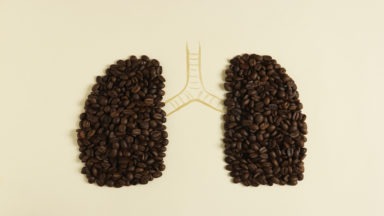Get Your Daily Cleanse with Flax Seed

Having a naturally, free flowing digestion system is a crucial element in maintaining overall health and vitality. Due to poor diets and lack of exercise, many people suffer from various digestive disorders, which lead to reduced energy levels and chronic disease.
With small changes to one’s diet, food itself can act as a gentle daily cleanse. One of the best natural digestive cleansers is ground flax seed. Ground flax seed can be easy incorporated into one’s diet and yields numerous benefits with regular usage.
Flax seed contains a balanced level of soluble and insoluble fiber that, together, act as a natural cleanse and detoxifier. Fiber prevents digestive disorders like constipation, hemorrhoids and diverticulosis. Both soluble and insoluble fiber are undigested. Instead of being used for energy like sugars, fats, and proteins, fiber is excreted from our bodies.
Quite different in their chemical properties, soluble fiber mixes with water in the digestive system and forms a gel, where as, insoluble fiber does not combine with water and passes through our digestive system. Due to the different chemical properties of these types of fibers, they perform different functions in the digestive tract:
Insoluble Fiber:
- controls and balances the pH (acidity) in the intestines which prevents microbes from producing cancerous substances, thus reducing the risk of colon cancer
- promotes regular bowel movements by preventing waste material from becoming rigid and increases the speed of movement of food and waste through the digestive tract
Soluble fiber:
- binds with fatty acids which reduces the absorption of fats and reduces caloric intake
- surrounds and reduces absorption of cholesterol leading to lower total cholesterol and LDL cholesterol (the Bad cholesterol)
- helps prolong stomach emptying time resulting in a slower release of sugars into the small intestines and reduced spiking of blood sugar levels, all of which, reduces risk of heart disease especially in individuals with diabetes
Additional Benefits of Flax Seed
- Along with the benefits of fiber, recent studies have shown that flax seed oil has healing properties for IBD (Crohn’s Disease and Colitis). Flax seed oil seems to be able to heal the inner lining of the inflamed intestines.
- Flax seed contains high levels of alpha linolenic acids, which is a type of plant-derived omega 3 fatty acid, similar to those found in fish. Many studies indicate that consuming alpha linolenic acids can lower total cholesterol and LDL cholesterol (the Bad cholesterol) levels. Other benefits show that flax seed may also help lower blood triglyceride and blood pressure. Regular intake of flax seed may also keep platelets from becoming sticky in the circulatory system therefore reducing the risk of heart attacks.
- Flax seed is also abundant in lignan, a type phytoestrogen (antioxidant). Studies suggest that lignan in flax seed has disease-fighting properties including a possible role in cancer prevention especially breast cancer. These studies propose that lignan metabolites are able to bind to estrogen receptors, which then inhibit the onset of estrogen-stimulated breast cancer.
Make a habit of adding fiber rich foods into your diet. The recommended daily intake of fiber is 25g per day with a combination of insoluble and soluble fiber. Part of this daily intake can be enjoyed with flax seed. Just eating whole flax seed yields little health benefit especially when trying to access the soluble fiber and healthy oil instead the seed. Grinding flax seed in a coffee grinder breaks down the seed allowing better access to its’ nutrients and cleansing qualities.
Flax seed oil is susceptible to oxidation and will turn rancid more quickly than other oils. If you pre-grind flax seed and wish to prolong its’ shelf-life, it should then be stored in an air-tight container, in the refrigerator. Do not cook (especially fry) foods with flax seed oil, as high temperatures break will down the oil causing it to lose its’ beneficial properties.
Ground flax seed has a nutty flavor and can be easily added to salads, soups, cereals, baking recipes, smoothies, and stews. Experiment with your recipes using flax seed in moderate quantities.
Best Foods for Healthy, Clear Skin: Treat Yourself to a Better Complexion

Healthy skin is beautiful skin and can be achieved by nourishing it from the inside out. Though its functions are often underestimated compared to other bodily systems, without the skin, we simply couldn’t survive.
Nutritious foods eaten consistently will begin to rebuild the cellular structure but this can take time as the skin has many layers. What you eat and drink now, can take four to six weeks to see the effects. By committing to a natural, whole foods diet, you’ll quickly begin to see healthy, beautiful, glowing skin.
List of Top 10 Best Foods for Healthy Skin
1. Lemon and Citrus Fruits – The Clarifiers
Citrus fruits, particularly lemon, juiced and sipped with water first thing in the morning or at any break are a wonderful complexion clearer. This little ritual gives your metabolism a kick start, your liver a much-needed mini cleanse, and your skin a vitamin C boost. Lemons are very cleansing to the body, so they help clarify the complexion. Another great way to incorporate it into your daily routine is to squeeze it over salad and vegetables or add slices to a jug of water.
2. Water – The Hydrator
Water makes up around 75-85% of your body—it’s even in your teeth and hair. Even though we’ve heard it all before, drinking pure water hydrates your body and prevents dry skin, keeping the cells hydrated, so they can easily uptake nutrients and remove waste.




































